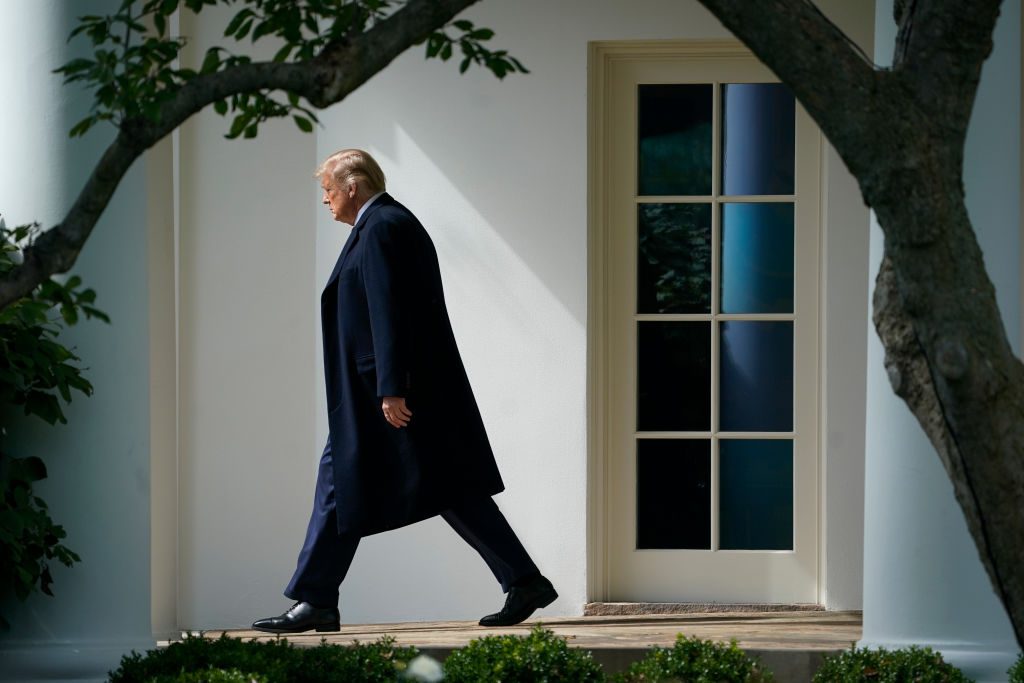A Think Tank Skeptical of Trump Triumphed in His First Term

“I think the nuclear deal is here,” Reuel Marc Gerecht told National Public Radio in June 2016. He was joining a cadre of national security hawks endorsing Hillary Clinton. “The issue is not, you know, downing the nuclear deal. That’s not going to happen.”
Gerecht, a talented and wily former CIA officer, has a neoconservative pedigree. And like many neocons, there are quotes aplenty over the years that aged like milk. He penned a fall 2002 New York Times piece called “An Iraq War Won’t Destabilize the Mideast.”
There, he dismissed the critics: “According to this critique, the region is a powder keg…. The Arab street would rise, radical Islamist recruiters would benefit from yet another grievance and Iraq’s fractious citizens — Arab Sunnis, Shiites, and Kurds — would possibly crack their country apart. Those cracks would spread throughout the region.”
But with the election of Donald Trump, Gerecht would get it wrong again, profitably so.
He and his home in Washington, the Foundation for the Defense of Democracies, would succeed in persuading the new administration to dump Barack Obama’s Iran nuclear deal, something that just two years prior was “not going to happen.”
After the 2018 decision to withdraw, the administration would usher through a wave of maneuvers endorsed by FDD: labeling Iran’s Islamic Revolutionary Guard Corps a terrorist organization, assassinating its famous comandante Qassem Soleimani, and sanctioning much of the Iranian elite.
When the U.S. slapped the latest round on the regime last month, in the midst of a pandemic, presidential race and economic crisis, an administration all-star team was nonetheless on hand to announce the decision. The Obama administration’s foreign policy was an “exercise in appeasement,” Secretary of State Mike Pompeo said. “It paved the way for Iran to become the arms dealer of choice for terrorist groups and dictators all across the world.”
Pompeo was joined that day in September by secretary of Treasury Steve Mnuchin, secretary of Defense Mark Esper, ambassador to the United Nations Kelly Craft, secretary of Commerce Wilbur Ross and national security advisor Robert C. O’Brien. The room practically had a Cabinet quorum.
If Donald Trump goes down in defeat next month, the Iran hawk endeavour will have less of an audience in the West Wing. Joe Biden was vice president to Obama, and has signaled intention to re-enter some sort of deal with the Iranians — though grappling with the medley of crises the American president will face come January could sap his will to stir up that hornet’s nest.
Cognizant of all this is FDD CEO Mark Dubowitz. Dubowitz fiercely maintains that he is not a partisan, and that he at one time merely wanted to improve the deal, not implode it. But that all elides the fact he has increasingly displayed an essentially open regime change posture on Iran, and his organization staffs, consults and wins policy victories so much more effectively under Republicans.
Yet, this is hardly an organization of open Trumpers. Indeed, it houses increasingly open critics of Trump, such as his former national security advisor, H.R. McMaster. The retired general recently censured the president on Afghanistan policy. This makes FDD’s success under a president known to demand loyalty all the more astonishing. They’ve gotten much for little.
The kinds of Democrats with whom FDD has relationships with, such as House Foreign Affairs Chairman Elliot Engel, are being increasingly sent out to pasture by the progessive left— as Engel was in his primary earlier year. That’s bad news for FDD under a potential period of Democratic ascendancy. But it’s also a perplexing reality for some in Trump’s coalition who take the president’s words about “endless wars” seriously and literally.
For all of Trump’s bromides against NATO, and teased pullouts in Syria and Afghanistan, he has at the same time turned up the heat on Iran. The potential for the U.S. plunging head-on into an attack on that country is very real in a second Trump term, as some current and former senior administration officials actually boast behind closed doors.
It’s astonishing stuff for hawks, like Gerecht, who once panicked that Trump was worse news than Clinton. In a few ways, that’s been borne out, but Iran has been an astounding exception for regime change enthusiasts. The memoir of Trump’s third national security advisor, John Bolton, details an administration civil war between Iran hawks, such as Mnuchin and senior counselor Jared Kushner, and Iran uber-hawks, such as Bolton himself and Pompeo.
Dubowitz drafted a seven-page policy memo to Trump’s National Security Council in the days after the forty-fifth president’s inauguration. At perhaps the height of FDD’s influence, a (since-canceled) project with the federal government spearheaded by an FDD official apparently actually engaged in attacks on domestic critics of administration Iran policy. The tables had completely turned from just a few years prior, when U.S. policy was the deal with Iran.
How a small, Trump-skeptical outfit like FDD wrote Iran policy in Trump’s first term is a story that can be investigated for years. It’ll be all the more relevant for anyone looking to change that in future administrations.
Comments